Pew Research Center conducted this study to understand how Americans’ views across a range of different domains have changed since 2016 and how those changes have impacted the coalitions of the two major candidates for president. For this analysis, we conducted an online survey of 11,001 U.S. adults (including 9,114 registered voters) between July 27 and Aug. 2, 2020.
Everyone who took part is a member of the Center’s American Trends Panel (ATP), an online survey panel that is recruited through national, random sampling of residential addresses. This way nearly all U.S. adults have a chance of selection. The survey is weighted to be representative of the U.S. adult population by gender, race, ethnicity, partisan affiliation, education and other categories. Read more about the ATP’s methodology. Here are the questions used for this report, along with responses, and its methodology.
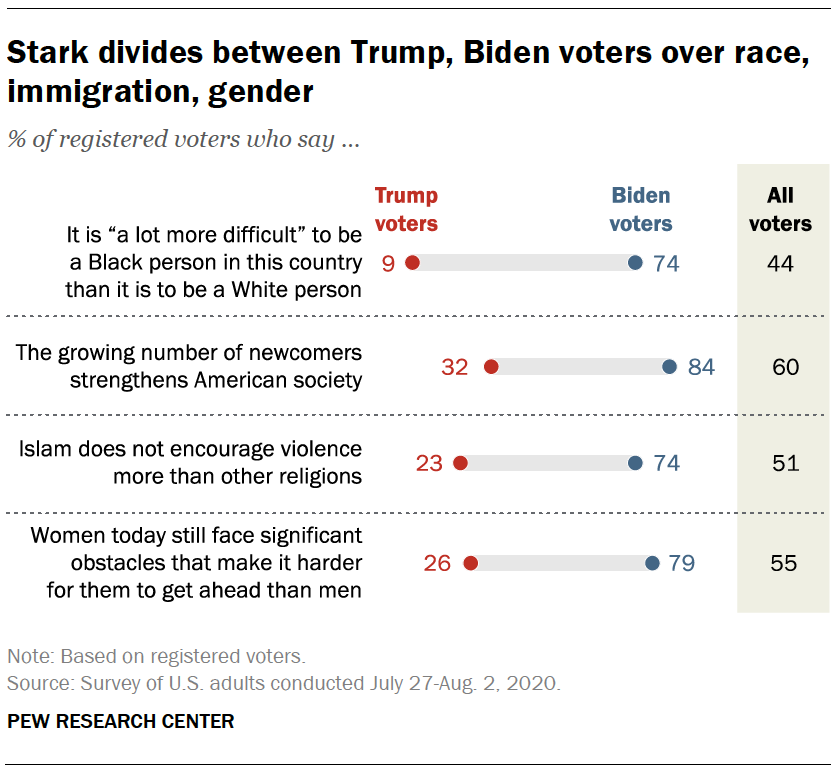 During the 2016 presidential campaign, supporters of Donald Trump and Hillary Clinton disagreed over nearly everything, including the extent to which Black adults in this country are disadvantaged because of their race and women because of their gender.
During the 2016 presidential campaign, supporters of Donald Trump and Hillary Clinton disagreed over nearly everything, including the extent to which Black adults in this country are disadvantaged because of their race and women because of their gender.
Today, these differences are even wider among voters who support Trump and those who back Joe Biden.
Across a range of political values – around race, gender and family, immigration and religion – there are stark contrasts between voters who support Trump and those planning to vote for Biden in November.
On some, such as attitudes about immigrants’ impact on American society, the differences between Trump and Biden supporters, while large, are no larger than the gap between Trump and Clinton voters four years ago.
But in opinions about race and gender, in particular, the divides are much wider. Among all registered voters, 44% say it is a lot more difficult to be a Black person than a White person in this country; 32% say it is a little more difficult, while 23% say it is no more difficult. The share of voters who say it is a lot more difficult to be Black has increased 9 percentage points since 2016.
This change has come entirely among supporters of the Democratic candidates: 74% of Biden supporters say it is a lot more difficult to be Black than White, while a smaller majority of Clinton supporters (57%) said this in 2016. Among Trump supporters, there has been virtually no change since 2016. Currently, 9% say it is a lot more difficult to be Black than White; 11% said this four years ago.
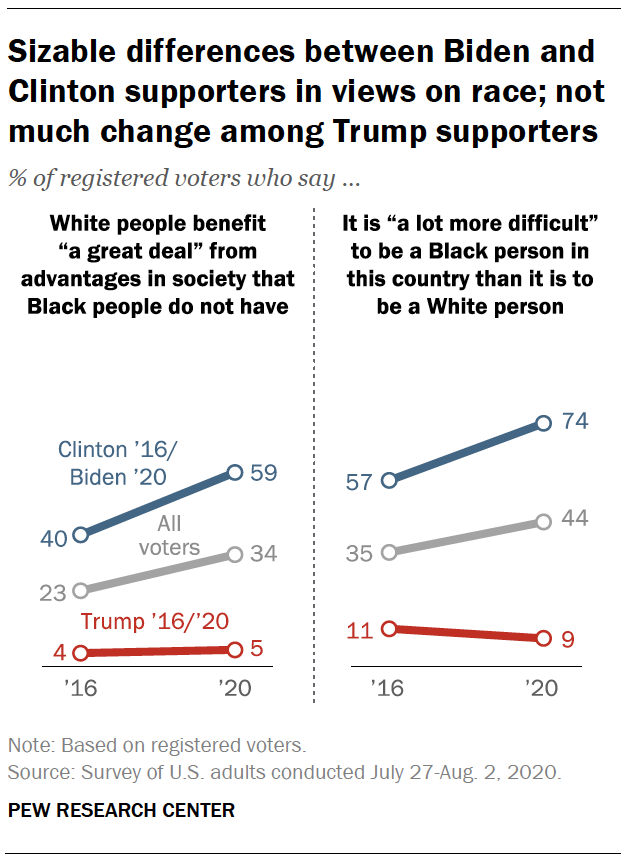 Thus the gap in opinions between Trump and Biden supporters in views of whether it is a lot more difficult to be Black (65 percentage points) is considerably larger than the difference between Trump and Clinton supporters in 2016 (46 points).
Thus the gap in opinions between Trump and Biden supporters in views of whether it is a lot more difficult to be Black (65 percentage points) is considerably larger than the difference between Trump and Clinton supporters in 2016 (46 points).
Biden supporters today also are more likely than Clinton supporters four years ago to say that White people benefit a great deal from advantages in society that Black people do not have. Currently, 34% of all registered voters say White people benefit a great deal from advantages that Black people lack, up from 23% in July 2016.
Again, the increase has come only among supporters of Democratic candidates: 59% of Biden supporters say White people benefit a great deal from societal advantages that Black people do not have. Fewer than half (40%) of Clinton supporters said this four years ago. Just 5% of Trump supporters say White people have a great deal of unfair advantages, which is virtually unchanged from 2016 (4%).
The survey by Pew Research Center, conducted July 27-Aug. 2 among 11,001 U.S. adults (including 9,114 registered voters) on the Center’s American Trends Panel, also finds growing divergence between the two camps on attitudes about gender and family: Biden voters today are now somewhat more likely than Clinton voters were to say women continue to face obstacles that make it harder for them to get ahead than men, while Trump supporters are now somewhat less likely to say this than they were in 2016.
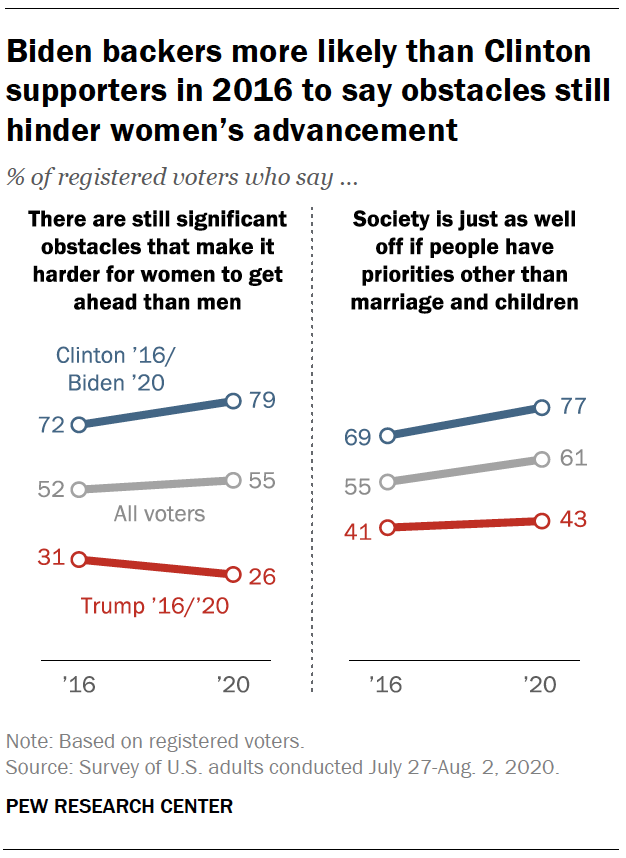 Opinion among all voters has changed little on whether women continue to face obstacles that make it harder for them to get ahead than men. Currently, 55% say there are still significant obstacles that make it more difficult for women than men to get ahead; 44% say the obstacles that once made it harder for women to get ahead are now largely gone.
Opinion among all voters has changed little on whether women continue to face obstacles that make it harder for them to get ahead than men. Currently, 55% say there are still significant obstacles that make it more difficult for women than men to get ahead; 44% say the obstacles that once made it harder for women to get ahead are now largely gone.
Among Biden supporters, 79% say women still face significant obstacles that make it harder for them to advance; a smaller majority of Clinton supporters (72%) expressed this view in 2016. By contrast, a somewhat smaller share of Trump supporters express this view today (26%) than did so four years ago (31%).
While stark divides between Trump and Biden supporters are evident on two other themes that were central to the 2016 campaign – views of immigrants and Islam – these divides are roughly comparable to the divides seen between Trump and Clinton voters in 2016.
An increasing share of registered voters – Trump and Biden supporters alike – say the growing number of newcomers to the country strengthens American society. In the new survey, 60% say this, while 37% say this threatens the nation’s customs and values. In 2016, opinion was divided: 50% said increasing numbers of newcomers to the U.S. were more of a threat to American customs and values, while 46% said they strengthened society.
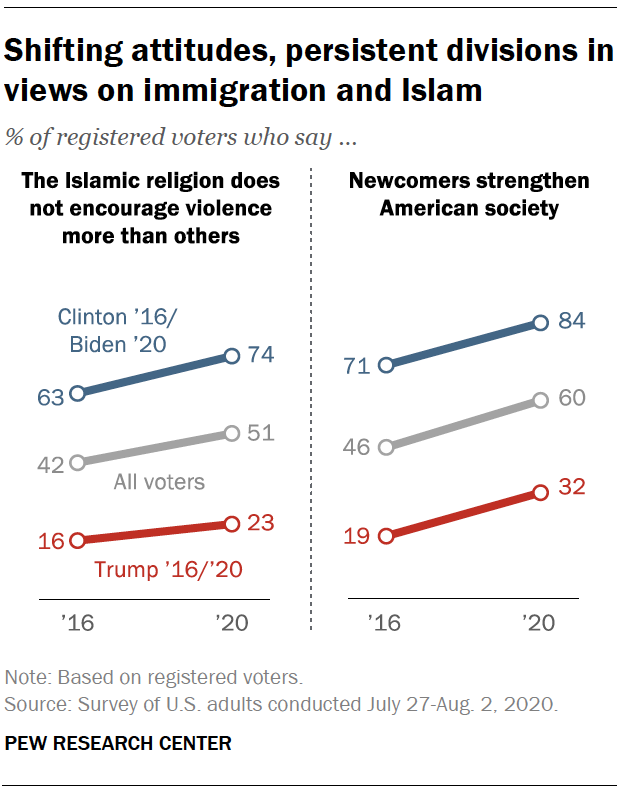 Only about a third of Trump supporters (32%) say immigrants do more to strengthen society, but this is a 13 percentage point increase from 19% in 2016. Biden supporters are more likely than Clinton supporters four years ago to say the growing number of newcomers strengthens society (84% vs. 71%).
Only about a third of Trump supporters (32%) say immigrants do more to strengthen society, but this is a 13 percentage point increase from 19% in 2016. Biden supporters are more likely than Clinton supporters four years ago to say the growing number of newcomers strengthens society (84% vs. 71%).
There also has been a shift across both the Republican and Democratic coalitions in views of whether Islam is more associated with violence than other religions. Today, 51% of voters say the Islamic religion does not encourage violence among its believers more than other religions, while 45% say it does. Four years ago, a 54% majority said Islam was more likely than other religions to encourage violence among its followers.
Most Trump supporters (72%) continue to associate Islam with violence, though the share saying this has declined 8 points since 2016. An even larger majority of Biden supporters (74%) than Clinton supporters (63%) say Islam does not encourage violence more than other religions.
Biden, Trump coalitions diverge over perceptions of structural racism
Overall, 44% of Americans now say that it is a lot more difficult to be a Black person in the U.S. than it is to be a White person, while 32% say it is a little more difficult and 23% say it is no more difficult. The share saying it is a lot more difficult to be Black than White is now 9 percentage points higher than it was in the summer of 2016.
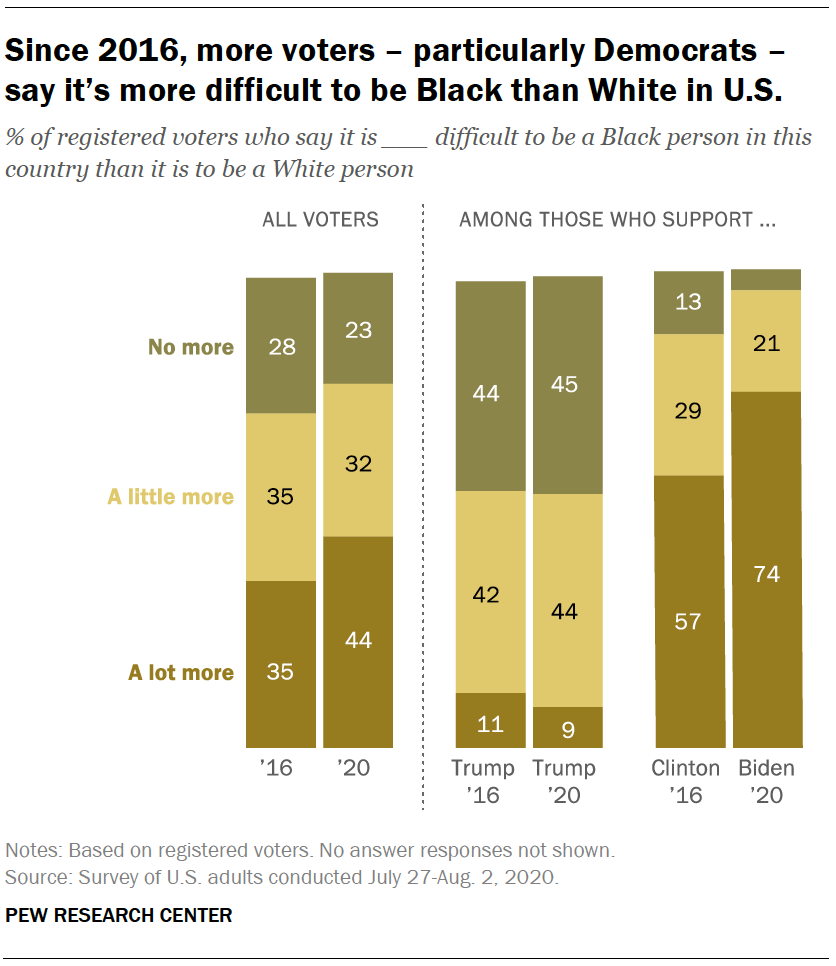 But while overall views have shifted, the shift has come exclusively from within the Democratic coalition. The attitudes of Trump supporters today look very similar to attitudes of Trump supporters four years ago: 45% of Trump voters now say that it is no more difficult to be a Black person in the U.S. than to be a White person, while 44% say Black people have it a little more difficult. Only about one-in-ten Trump supporters say that Black people have it a lot more difficult than White people.
But while overall views have shifted, the shift has come exclusively from within the Democratic coalition. The attitudes of Trump supporters today look very similar to attitudes of Trump supporters four years ago: 45% of Trump voters now say that it is no more difficult to be a Black person in the U.S. than to be a White person, while 44% say Black people have it a little more difficult. Only about one-in-ten Trump supporters say that Black people have it a lot more difficult than White people.
Biden’s backers, on the other hand, are substantially more likely today than Clinton’s backers were in 2016 to say that it is a lot more difficult to be Black than White (74% today vs. 57% in 2016).
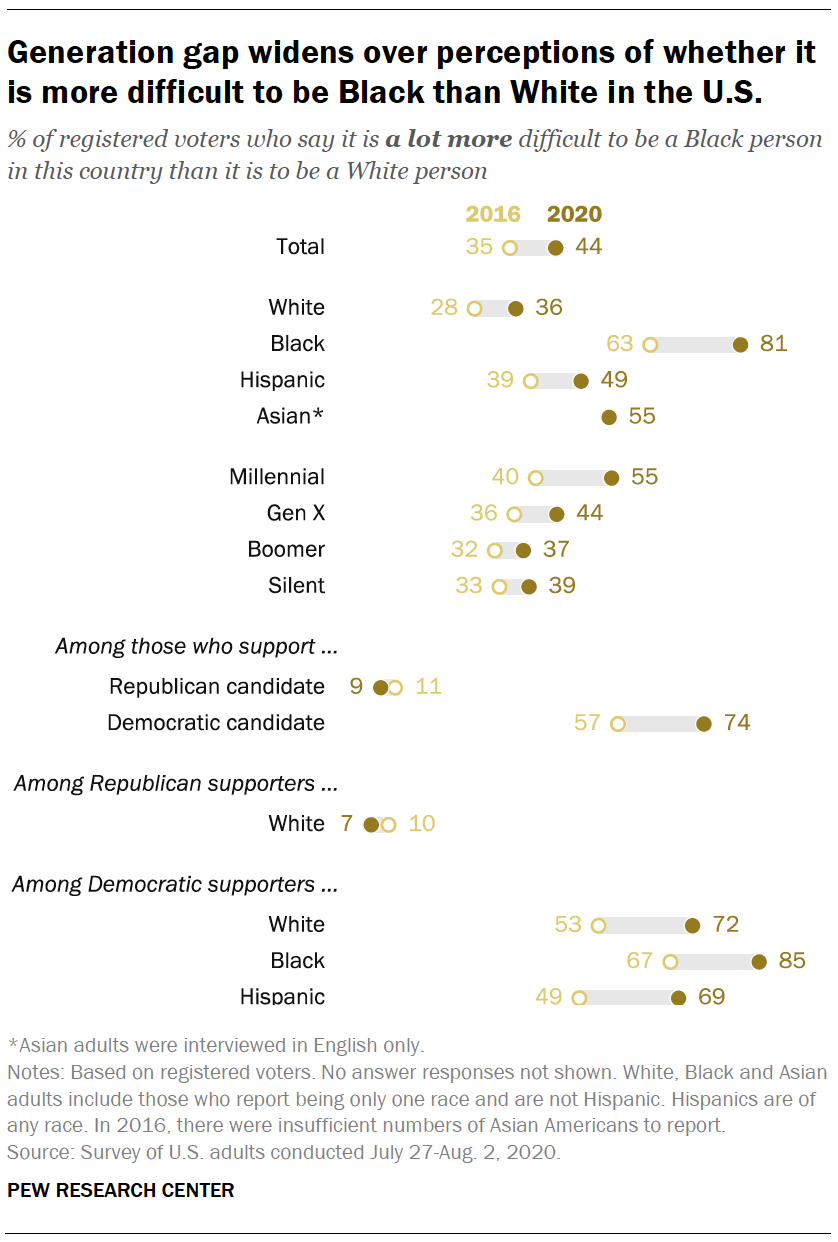 Younger cohorts and those who support Democratic candidates for president have shifted most in these views over the past four years. White voters and those who support Trump have moved least.
Younger cohorts and those who support Democratic candidates for president have shifted most in these views over the past four years. White voters and those who support Trump have moved least.
In 2016, there were only modest generational differences on the question of whether it is more difficult to be Black than White. There is currently a wider generational gap on this question – with a majority of Millennial voters (55%) saying this compared with 44% of Generation X voters, 37% of Boomer voters and 39% of Silent Generation voters.
Across racial and ethnic groups, growing shares now say it is more difficult to be Black than White in the country, though the overall change is more pronounced among Black voters than White or Hispanic voters. However, this largely reflects the partisan leanings of these groups. Within the Democratic coalition the shift has been similar across racial and ethnic groups.
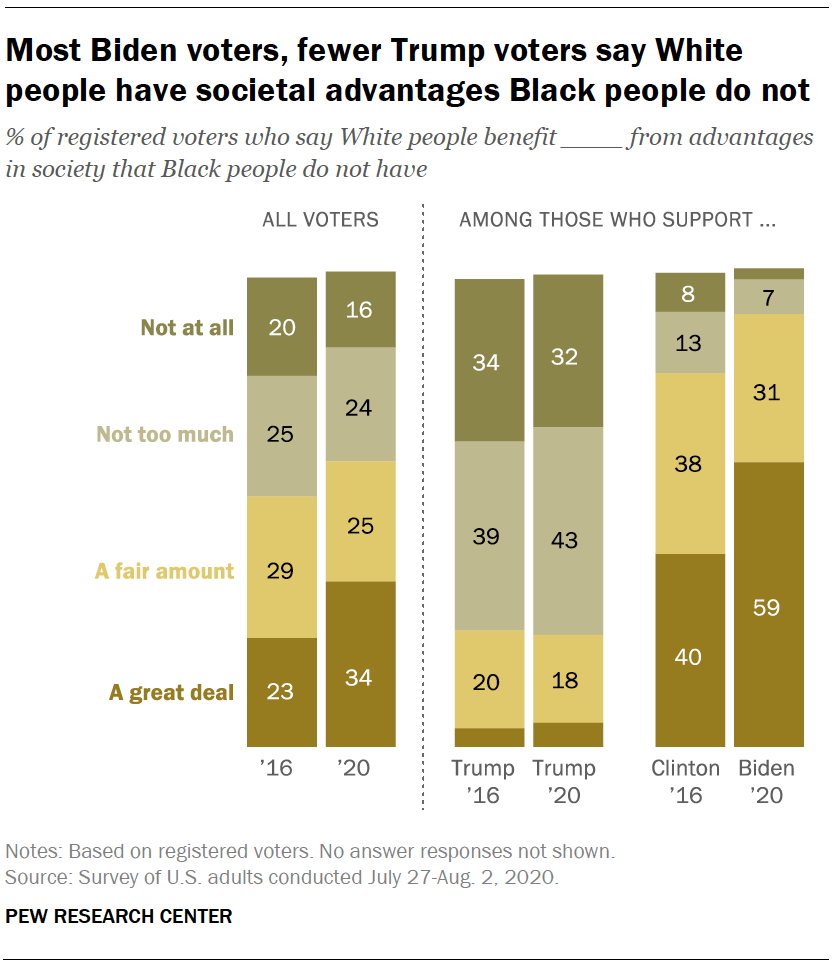 The pattern of opinion on the question of whether White people benefit from societal advantages Black people do not have is largely parallel, with a larger share of voters now saying that White people benefit a great deal from advantages in society that Black people don’t have. While Biden’s supporters are substantially more likely to say that White people have advantages than Clinton supporters were in 2016 (59% today, 40% then), just 5% of Trump supporters say this today – little different than the 4% who said this in 2016.
The pattern of opinion on the question of whether White people benefit from societal advantages Black people do not have is largely parallel, with a larger share of voters now saying that White people benefit a great deal from advantages in society that Black people don’t have. While Biden’s supporters are substantially more likely to say that White people have advantages than Clinton supporters were in 2016 (59% today, 40% then), just 5% of Trump supporters say this today – little different than the 4% who said this in 2016.
Though both Black and White voters are now more likely to say White people benefit from societal advantages than they were in 2016, there remain wide racial differences in these views – even taking partisanship into account. About eight-in-ten Black Biden voters (81%) say White people benefit a great deal from advantages that Black people don’t have, up from 64% among Clinton’s Black supporters in 2016. By comparison, about half (51%) of White Biden supporters currently say this, up from 29% among White Clinton supporters in 2016.
Views about gender and family increasingly divide the coalitions
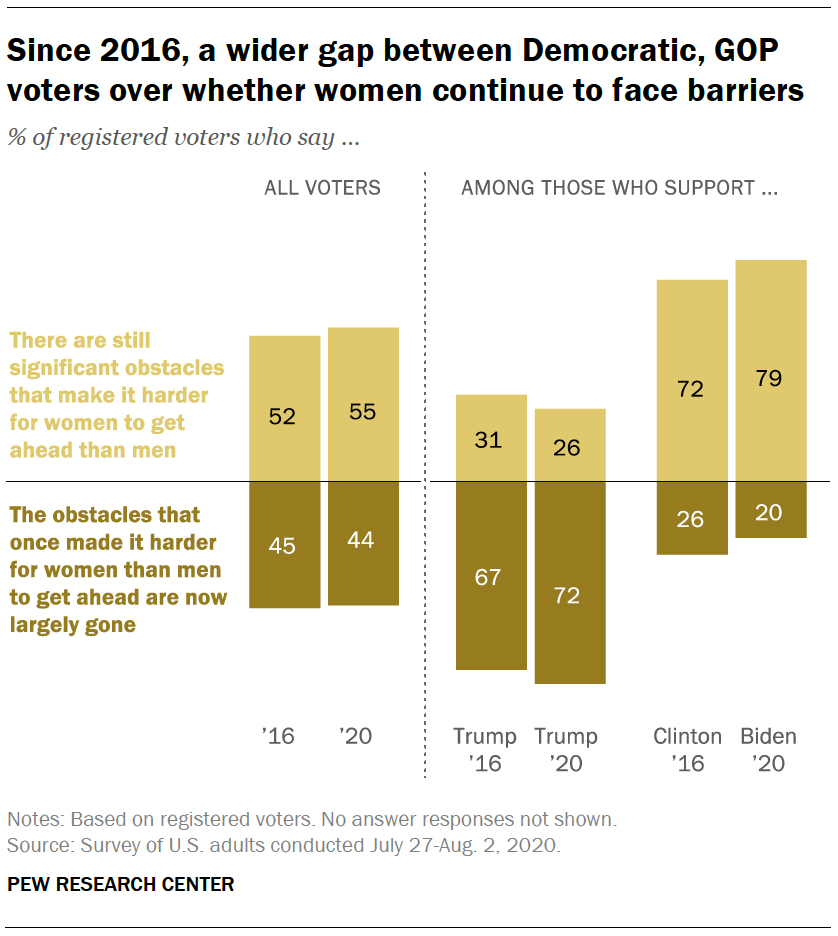 Overall, a narrow majority of voters say that women today still face significant obstacles that make it harder for them to get ahead than men (55%), while fewer (44%) say that obstacles that once made it harder for women to get ahead are now largely gone.
Overall, a narrow majority of voters say that women today still face significant obstacles that make it harder for them to get ahead than men (55%), while fewer (44%) say that obstacles that once made it harder for women to get ahead are now largely gone.
These overall views are little changed from 2016, but the already wide gap between the Democratic and Republican coalitions is now even wider.
Today, 72% of Trump voters say that obstacles that once made it harder for women are now largely gone, up from 67% in 2016. By contrast, just 20% of Biden voters currently say this – a modest decline from the 26% among Clinton voters in 2016.
Women supporters of each candidate remain somewhat more likely than men to say that significant obstacles still exist for women, but the political divide in these views is far greater than the gender gap.
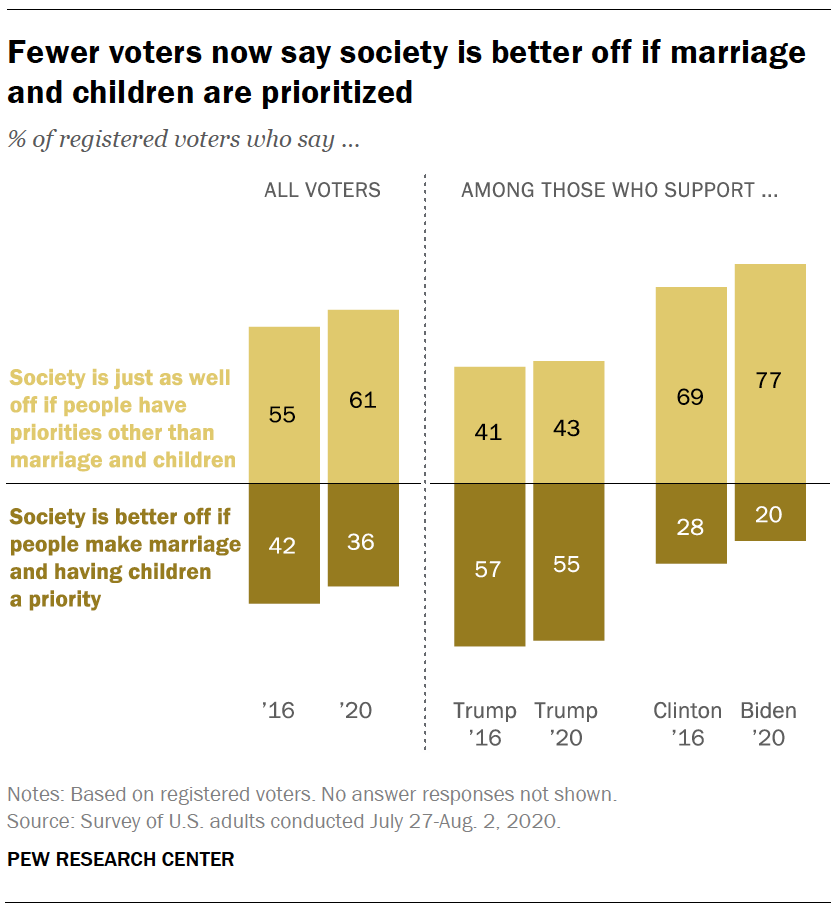 When asked about societal priorities around family, voters are somewhat less likely to say that society is better off if people make marriage and having children a priority than they were four years ago (36% today, 42% in 2016). As was the case in 2016, a slim majority of Trump’s voters this year say this (55% today, 57% in 2016). But Biden voters are slightly more likely today to say that society is just as well off if people have priorities other than marriage and children than Clinton voters were in 2016 (77% today, 69% in 2016).
When asked about societal priorities around family, voters are somewhat less likely to say that society is better off if people make marriage and having children a priority than they were four years ago (36% today, 42% in 2016). As was the case in 2016, a slim majority of Trump’s voters this year say this (55% today, 57% in 2016). But Biden voters are slightly more likely today to say that society is just as well off if people have priorities other than marriage and children than Clinton voters were in 2016 (77% today, 69% in 2016).
While stark divides remain over immigration, a smaller share of both GOP and Democratic voters see newcomers as a threat to American values
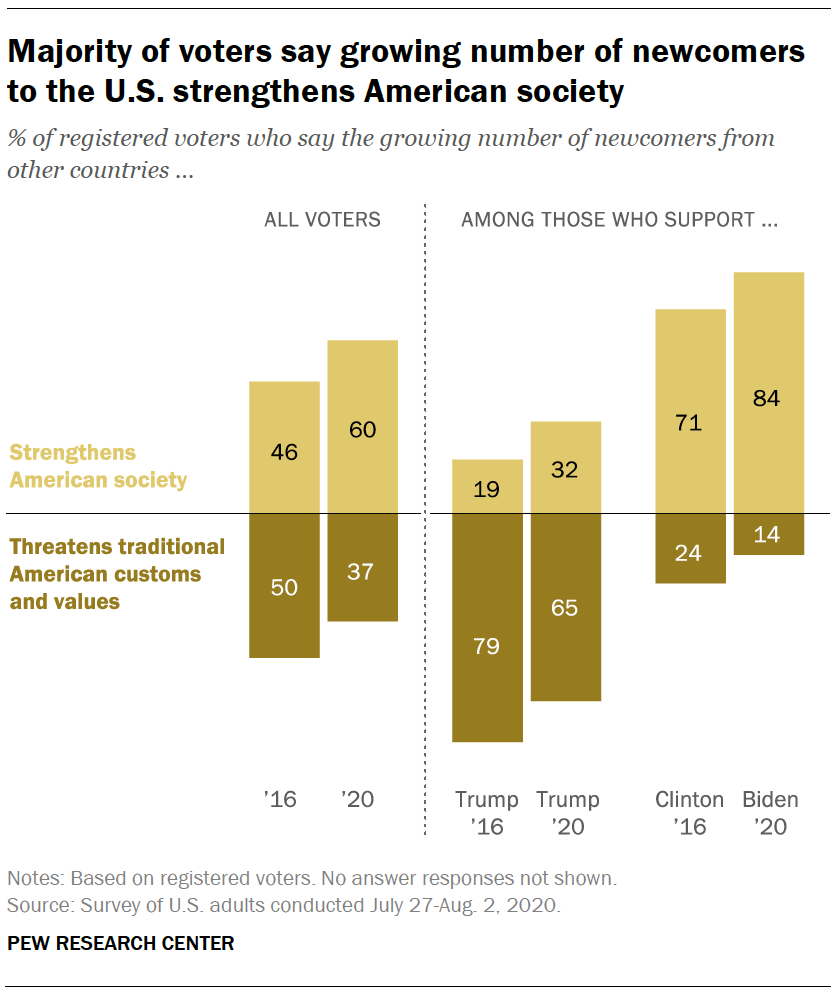 In 2016, some of the largest issue divides between Trump and Clinton supporters were around attitudes about the nation’s growing racial and ethnic diversity and immigration. These views had been some of the key distinguishing characteristics of Trump’s strongest supporters in his path to the GOP nomination earlier that year.
In 2016, some of the largest issue divides between Trump and Clinton supporters were around attitudes about the nation’s growing racial and ethnic diversity and immigration. These views had been some of the key distinguishing characteristics of Trump’s strongest supporters in his path to the GOP nomination earlier that year.
As in 2016, there continue to be stark differences in these views – but these gaps have not been growing, and voters across the political spectrum have shifted in a more liberal direction in this domain.
In 2016 voters were about evenly divided in the share saying that the growing number of newcomers strengthens American society (46%) and the share who said they threaten traditional American customs and values (50%). Today, six-in-ten American voters (60%) say that newcomers strengthen American society and 37% say they threaten traditional customs and values.
Supporters of both major party candidates this year are more likely than 2016 supporters to have positive views of immigrants to the United States, but the gap between supporters of the Republican and Democratic candidates is little different than it was four years ago. Today, more than eight-in-ten Biden supporters (84%) say the growing share of newcomers in the U.S. strengthens American society, up from 71% among Clinton supporters in 2016. By comparison, a much smaller share of Trump supporters (32%) view immigration as strengthening society. Still, that is up from just 19% among Trump supporters in 2016.
Views of Islam largely divide the Trump-Biden coalitions
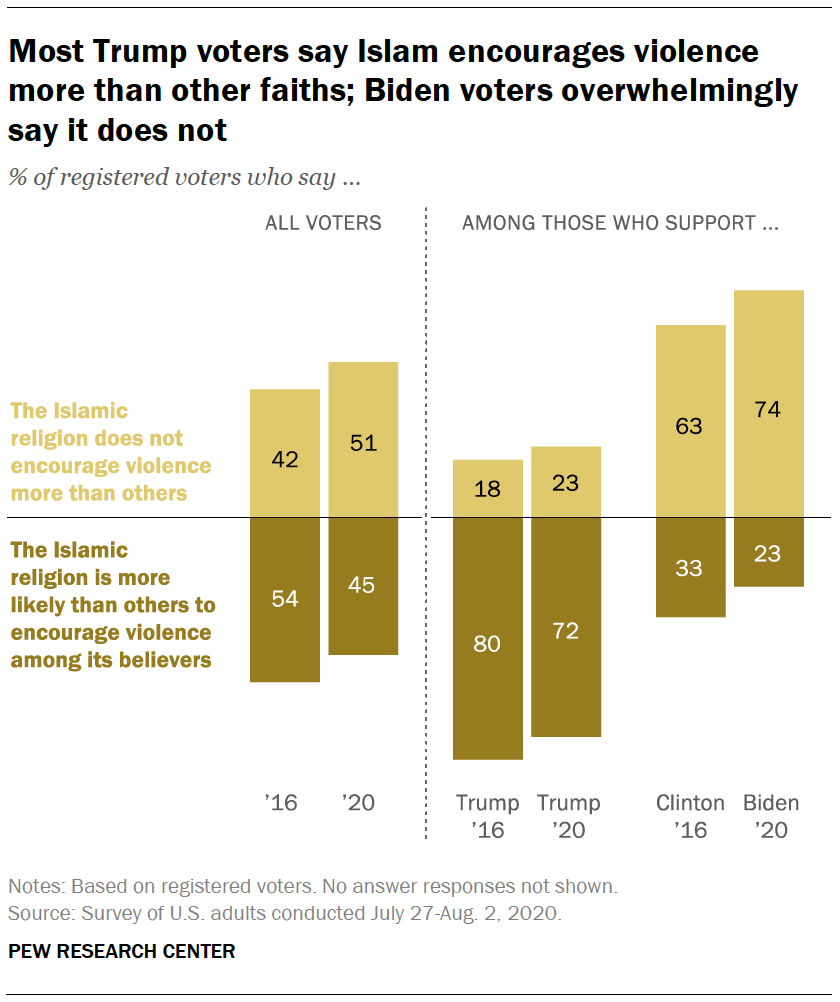 The trajectory on views about Islam is similar to that of newcomers from abroad.
The trajectory on views about Islam is similar to that of newcomers from abroad.
Four years ago, a narrow majority (54%) of voters said that Islam was more likely than other religions to encourage violence among its followers. Today, the balance of opinion has shifted in the other direction, with 45% of voters saying that Islam is more likely to encourage violence and 51% saying it does not encourage violence more than other religions.
As was the case with attitudes about immigration, the gulf between Trump voters and Biden voters remains as wide as it was four years ago between supporters of Clinton and Trump, even as views in both coalitions have shifted.
Today, roughly three-quarters of Biden backers (74%) say Islam does not encourage violence more than other religions, up from 63% of Clinton’s supporters in 2016.
By contrast, just 23% of Trump’s supporters reject the assertion that Islam is more encouraging of violence than other religions, while 72% say Islam is more likely to encourage violence than other religions. In 2016, fully 80% of Trump supporters said Islam encouraged more violence.


